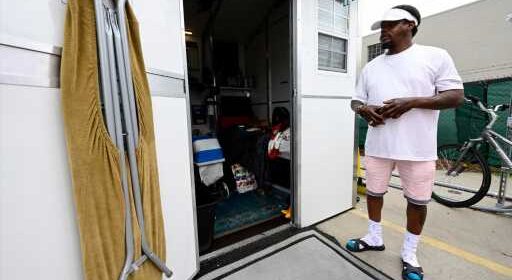Denver set to spend millions on temporary Pallet shelters for homeless, sites still unknown

The city of Denver is poised to spend more than $5 million on 200 prefabricated Pallet shelter homes toward Mayor Mike Johnston’s goal of providing shelter for 1,000 people living homeless on the city’s streets by the end of the year.
The administration is eyeing paved lots as the future landing places for the easy-to-assemble, temporary shelters, Cole Chandler, the mayor’s top homelessness advisor, told a City Council committee Tuesday.
But just where those paved lots — and undeveloped “raw dirt” lots that Chandler said are being considered for villages of manufactured tiny homes — will be located remains unknown outside of executive sessions and private talks between city officials and property owners.
The council’s finance and governance committee on Tuesday signed off on a $7 million master purchase order with Everett, Washington-based Pallet. The public benefit corporation has emerged as a leading provider of temporary shelters for people experiencing homelessness or those impacted by disasters. Its shelters, made up of composite panels hooked into aluminum frames, are shipped on wooden pallets. They are currently in use in 85 cities including Los Angeles and Dallas, according to the company.
Per city documents, the purchase agreement would provide enough shelters, furnishings and support facilities to outfit three sites.
The contract must still be approved by the council as a whole before it is finalized but the committee hearing indicated there is broad support for the deal which would be paid for out of the city’s Department of Housing Stability budget.
“You and I have talked a lot about the fact that housing involves a roof and a door and so I’m really excited to see these come through,” Councilwoman Amanda Sawyer , the committee chair, said to Chandler Tuesday.
“I think this is a huge improvement over the tents that we previously paid for,” Sawyer added, referencing the city-funded Safe Outdoor Spaces sanctioned campsites she previously opposed.
That order covers not just the walls, floors and rooves of the 200 homes but also beds, folding desks and other furnishings for the 70-square-foot structures. Eleven larger shelters that would house bathrooms, three accessible units, six structures that can be used as community rooms where residents gather for meals or to work with service providers and three units that would house on-site laundry facilities are also part of the arrangement.
“We know that housing is the solution to homelessness and that is where our long-term solutions point,” Chandler said. “Pallet shelters will be a space (where) people can get off the streets immediately while they’re working to move into longer-term housing options.”
The city’s quote from Pallet is for $5.1 million, according to Chandler. That includes shipping from Washington. The extra money included in the purchase order request allows the city to buy more shelters and equipment if needed. The contract runs through the end of August 2024 but can be extended for another year. The 200 units could be in Denver by Nov. 1, Chandler said.
The shelters come with in-unit heat and air conditioning, Amy King, Pallet’s CEO told councilmembers Tuesday. With its temporary shelters occupying 120 sites spread across 22 states from Wisconsin to California, King emphasized that the shelters are tested in a variety of weather conditions.
Some Pallet shelters are already in use at a Safe Outdoor Space in Denver and in the city of Aurora.
Assuming the council approves the contract in the weeks ahead, there is a secondary cost the city will have to absorb. Chandler estimated setting up the shelters and support buildings and hooking them into utilities would cost $1 million per site.
Chandler expects those costs to come out of on-call contracts the city already has in place through its Department of Transportation and Infrastructure.
On Monday night, the City Council approved extending the emergency declaration Johnston put in place on his second day in office that marshal city resources around his goal to provide shelter to 1,000 people this year. The emergency declaration is now in place through Sept. 18.
That declaration has allowed the city to activate its emergency operations center, rededicating staff time from 50 or more city employees from 9 a.m. to 1 p.m. each day. It also allows the city to cut through red tape to speed up procurement processes. The Pallet’s contract was awarded without an open bid process under the powers of that declaration, according to the city.
Sawyer was the lone dissenting vote on the extension request Monday. She previously voted against extending the declaration in June because she felt the Johnston administration was not providing enough information to the council about its work.
Those concerns persist for Sawyer especially when it comes to specifics around how Johnston plans to pay for things like setting up and staffing tiny home villages. The administration has filed an application to tap into more federal COVID aid money at the state level to support its work. Million of dollars from the American Rescue Plan Act, or ARPA, that Denver has already earmarked for projects including housing and homelessness resolution may also be in the mix but Sawyer has reservations about that money being redirected after a public input process about its use was already done.
“How can we as council members tasked with budget oversight do our job of ensuring that residents’ voices are heard if we don’t know whether the mayor’s office intends to alter the ARPA funding plan and is it fair to our residents if we do that?” she asked before casting her No vote.
Stay up-to-date with Colorado Politics by signing up for our weekly newsletter, The Spot.
Source: Read Full Article
